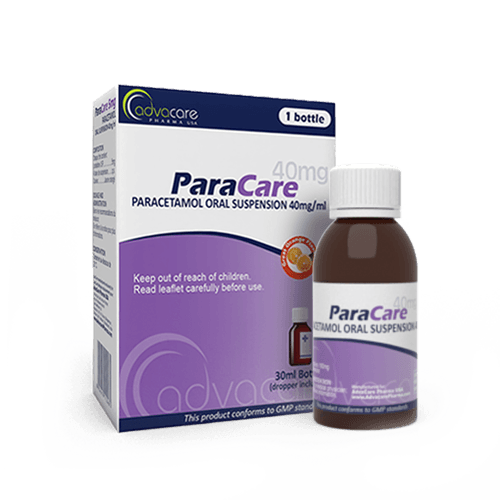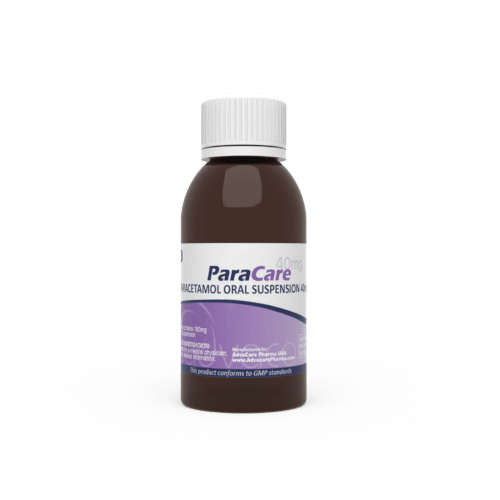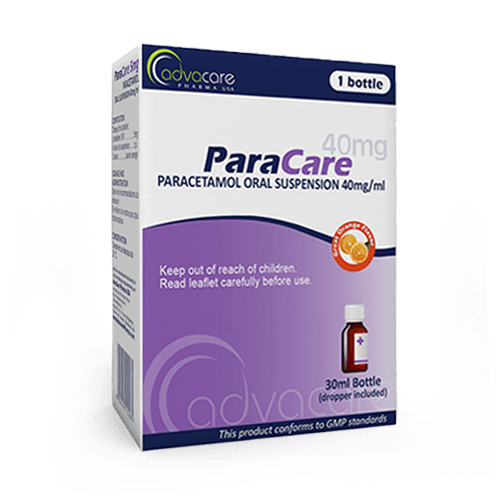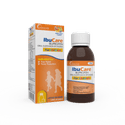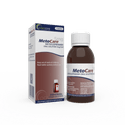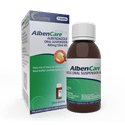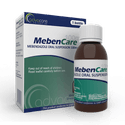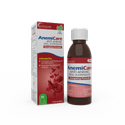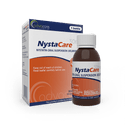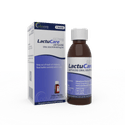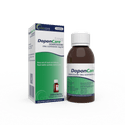- Home›
- Pharmaceuticals›
- Pharmaceutical Suspensions›
- Oral Suspensions›
- Paracetamol Suspension
Paracetamol Suspension
Form
Dosage
Packaging
What is Paracetamol?
Active Ingredients: Paracetamol
Paracetamol Suspension is an analgesic/antipyretic drug used to reduce fever and relieve mild to moderate pain. This medication is a safe and effective treatment for children, infants, and neonates. It is a first-line therapy for pain conditions, as recommended by the World Health Organization (WHO).
Paracetamol belongs to the groups of medications called analgesics (pain relievers) and antipyretics. Though it is unclear the exact site of action, it may work by either inhibiting prostaglandin synthesis or by activating descending serotonergic pathways. Paracetamol is also known by the name acetaminophen.
Paracetamol Suspension is particularly favored for its lower risk of causing stomach irritation and its lack of effect on platelet function, unlike non-steroidal anti-inflammatory drugs (NSAIDs) like Ibuprofen. This makes it a more suitable option for individuals who have a history of gastric ulcers or who are taking blood thinners.
Despite its safety profile, this drug must be used within dosage limits as overdose can lead to serious liver damage, a risk that is heightened with concurrent alcohol use or in individuals with pre-existing liver conditions.
In terms of administration, Paracetamol Suspension is convenient for use in children and infants due to its liquid form and palatability. The dosage is determined based on weight in young patients to ensure safety and efficacy. It is important for caregivers to use the measuring device provided with the product to accurately measure the dose.
Paracetamol is often used in combination with other medications, such as in cold and flu remedies. Check for the presence of Paracetamol in these combination products to avoid accidental overdose.
AdvaCare Pharma is a global distributor of Paracetamol Suspension. AdvaCare excels at the production of high-quality yet cost-effective supplies and medicines. This product has been manufactured in our GMP-certified facilities located in China, India, and the USA.
Why are we a quality Paracetamol manufacturer?
AdvaCare Pharma, a GMP-compliant pharmaceutical company, specializes in the manufacture of Paracetamol Suspension. Our strategic manufacturing locations and innovative management systems ensure full control over the supply chain, resulting in enhanced quality standards and decreased costs throughout the production, transport and import processes. As a trusted Paracetamol manufacturer, we globally supply a comprehensive range of 55+ oral liquid medicines in suspension dosage form to more than 65 countries.
Uses
What is Paracetamol used for?
It is used to reduce pain caused by conditions like headaches (including migraines and tension headaches), toothache, nerve pain, backache, muscle pain, joint pain, and sore throat. It may also be used to reduce fever and relieve cold or flu symptoms.
How should Paracetamol Suspension be used?
This medication is manufactured as a liquid to be taken orally.
What dose should be taken?
Recommended dosage:
- For adults, the usual dose is 325-1000mg, taken every 4-6 hours. The maximum dosage is 3000mg per day.
- For children and adolescents aged 12 to 18 years old, the usual dose is 325-650mg, given every 6-8 hours. The maximum dosage is 1g every 4 hours or 4g per day.
- For infants and children under 12 years of age, the usual dose is 10-15mg/kg, given every 6-8 hours. The maximum dosage is 75mg/kg per day (up to 1g every 4 hours or 4g per day).
- For neonates, the usual dose is 10-15mg/kg, given every 6-8 hours. The maximum dosage is 60mg/kg per day.
Refer to a doctor or pharmacist for guidelines on dosage. Do not exceed what they advise.
Is Paracetamol Suspension effective in treating all types of pain?
While Paracetamol is effective in treating mild to moderate pain, it may not be sufficient for severe pain or certain types of pain such as intense neuropathic pain. In such cases, additional or alternative medication might be required, and a physician should be consulted.
How does Paracetamol Suspension interact with over-the-counter cold and flu medications?
Care should be taken when using this drug with over-the-counter cold and flu medications, as many of these contain Paracetamol as an active ingredient. Using multiple products containing Paracetamol can lead to accidental overdose and increase the risk of liver damage.
How quickly does Paracetamol Suspension begin to work?
Paracetamol Suspension typically starts to reduce pain and fever within 30 minutes to an hour after ingestion. The peak effect is usually observed within 1 to 2 hours.
Can Paracetamol Suspension be used for post-vaccination fever in children?
Yes. Its use is generally safe and effective for this purpose, but it should be administered according to the recommended dosage for the child’s age and weight.
How does Paracetamol Suspension differ from NSAIDs in terms of mechanism of action?
Unlike NSAIDs, which inhibit COX enzymes and reduce the production of prostaglandins leading to reduced inflammation, Paracetamol is thought to reduce pain by inhibiting prostaglandin synthesis in the brain and might have a minimal effect on inflammation.
Is Paracetamol Suspension suitable for all types of fever?
Paracetamol Suspension is deemed effective for reducing fever associated with various conditions, including infections, post-vaccination reactions, and common colds. If the fever is persistent, unusually high, or accompanied by other serious symptoms, seek medical attention.
Can Paracetamol Suspension be used in elderly patients?
Paracetamol can be used in elderly patients, but caution is advised due to potential age-related changes in drug metabolism and excretion. Elderly patients may be more prone to side effects at higher dosages, and adjustments in dosage may be necessary.
Can Paracetamol Suspension be used during pregnancy?
Paracetamol is generally considered safe for use during pregnancy, but it should be used under the guidance of a doctor. While it is deemed a safer option compared to NSAIDs or opioids, unnecessary use or doses higher than recommended can pose risks to the fetus, particularly in the first and third trimesters.
Is Paracetamol Suspension safe for breastfeeding mothers?
Paracetamol is considered safe for use in breastfeeding mothers. It is excreted in breast milk in small quantities, and no adverse effects have been reported in breastfed infants. Nursing mothers should consult a healthcare provider before using.
Can Paracetamol Suspension be used in patients with gastrointestinal issues?
Paracetamol is generally considered safe for patients with gastrointestinal issues, as it is less likely than NSAIDs to cause stomach irritation or bleeding. A doctor should be consulted prior to use.
Is there a risk of dependency or addiction with Paracetamol Suspension?
Paracetamol is not known to cause dependency or addiction, which makes it a preferred option for pain relief, especially compared to opioid painkillers. It can be used safely for short-term pain relief without the risk of developing a physical or psychological dependence.
How does Paracetamol Suspension affect liver function?
While the drug is safe when used at recommended doses, excessive use or overdose can lead to acute liver damage, potentially resulting in liver failure. This risk is heightened in individuals with existing liver conditions or those who consume alcohol regularly.
Can Paracetamol Suspension be taken on an empty stomach?
Paracetamol Suspension can be taken with or without food. If any stomach discomfort is experienced, it may be helpful to take the drug with food or milk.
How long can Paracetamol Suspension be used for pain relief?
This medication is suitable for short-term pain relief, and its use should ideally not exceed a few days for adults or children unless advised by a healthcare provider. For chronic pain conditions, continuous use should be under medical supervision.
Does Paracetamol Suspension interact with herbal supplements or alternative medicines?
Paracetamol can potentially interact with certain alternative medicines. Supplements known for their effects on liver function, such as St. John's Wort or kava, may alter the metabolism or increase the toxicity risk of Paracetamol. A doctor must be consulted before taking these medicines concurrently.
Side Effects
As with all pharmaceuticals, some unwanted effects can occur from the use of Paracetamol Suspension.
Common side effects include, but may not be limited to:
- tiredness or weakness
- nausea
- stomach ache
- constipation
Seek medical attention if the following develop:
- swelling
- difficulty swallowing or breathing
- rash
For a comprehensive understanding of all potential side effects, consult a medical professional.
If the minor side effects are reported while taking Paracetamol Suspension, these usually resolve on their own. Simply stay hydrated, and eat a balanced diet to alleviate stomach discomfort.
In cases where the side effects persist or become bothersome, consult a doctor. Severe reactions require immediate medical attention, as these could be signs of significant complications.
Precautions
Do NOT use Paracetamol Suspension if:
- You have liver disease or a history of alcoholism.
- You have severe kidney problems.
Paracetamol Suspension can interact with certain medications that affect liver metabolism, such as antiepileptic drugs like phenytoin, barbiturates, and carbamazepine, potentially leading to increased risk of liver damage.
Concomitant use with warfarin, an anticoagulant, may enhance the risk of bleeding due to altered warfarin metabolism and effects. Chronic use of Paracetamol with alcohol or other hepatotoxic drugs can significantly increase the likelihood of hepatotoxicity.
Consult with a doctor or pharmacist about your medications before beginning treatment.
References
Recent Advances in Pediatric Use of Oral Paracetamol in Fever and Pain Management
This is a systematic literature search that includes systematic reviews and meta-analyses. The main objective was to maximize efficacy and avoid delays in the effect of paracetamol.
Older clinical studies using paracetamol at subtherapeutic doses of ≤ 10mg/kg generally show that it is less effective than non-steroidal anti-inflammatory drugs (NSAIDs), but recent evidence shows that when used at a dose of 15mg/kg for fever and pain management, paracetamol is more effective than placebo, and as effective as NSAIDs.
When administered in repetitive doses over consecutive days, paracetamol presents a reduced risk of adverse events compared to NSAIDs. Unlike NSAIDs, paracetamol is approved for usage in children of all age groups.
The conclusion of this study is that clinical evidence supports the safety and efficacy of paracetamol at 15mg/kg for alleviating pain and reducing fever in children.

You might be interested in...
Why AdvaCare Pharma?
As an industry leader, we are aware of our responsibility to provide affordable and sustainable solutions to improve healthcare worldwide.
